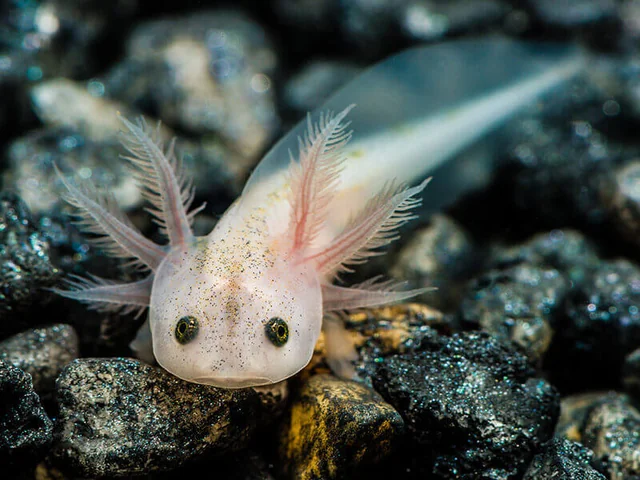Axolotl: The Adorable Alien of the Aquatic World

Picture this: a creature that resembles a Pokémon, never grows up and can regrow its limbs like a superhero. Sounds unreal, right? Well, meet the axolotl! This little amphibian is one of the most fascinating animals in nature.
The axolotl (Ambystoma mexicanum) is a species of salamander known for its unique inability to undergo complete metamorphosis. While other salamanders transform from aquatic larvae into adults that live on the land, axolotls just decide to stay tadpole-like forever. It’s like they refuse to grow up.
Axolotl is native to the lakes of Mexico, especially Lake Xochimilco and they were once found in abundance. However, due to habitat destruction, pollution and the introduction of invasive species like tilapia and carp, which eat axolotl eggs, once wildly populated Axolotl are now among the endangered species.
The Real-Life Regeneration Masters
What if humans could regrow lost limbs? Sounds incredible! Well, axolotls do that. They have an amazing capability to replace not only their limbs but also a part of their heart, spinal cord and in some cases their brain. If an axolotl has a missing leg, it will simply regenerate it. The reason scientists are so interested in them is because of their healing capabilities and if we can figure out how they do it without scarring, this could potentially enable us to aid individuals in healing their wounds, spinal cord injuries or even organ damage. A future where people can grow back their amputated limbs SOUNDS LIKE SOMETHING OUT OF A SCI-FI MOVIE, RIGHT?
They Always Look So Happy
Their wide, goofy grin makes them look like they are permanently thrilled to be alive. But don’t be fooled, they are not actually smiling. That is just how their face is shaped.
Their external gills—those feathery structures protruding from their heads—are among their most distinctive features. Unlike other amphibians that develop lungs as adults, axolotls rely on these gills to breathe underwater. They also have lungs and can absorb oxygen through their skin, but they rarely use them.
Axolotl Superpowers: More Than Just Regeneration!
Axolotls have more tricks up their sleeves than just limb regrowth. Here are some of their coolest abilities:
- They can pause aging: Axolotls stay in their juvenile form their entire lives due to a condition called neoteny. But if given certain hormones (like iodine), they can actually complete metamorphosis and become land-dwelling salamanders.
- They can change colors: Some axolotls can slightly adjust their pigmentation to blend with their environment. Scientists are even studying genetically modified axolotls that glow under UV light.
More Fun Facts!
- They need cool water (below 20°C/68°F) since high temperatures can be stressful for them.
- They are messy eaters and require a properly filtered tank.
- They prefer live food like bloodworms, brine shrimp, and small fish, but can also eat pellets.
- They should not be handled often—their skin is delicate and has a tendency to get injured easily.
- Axolotls come in various colors, including:
- Wild-type: Dark brown with golden flecks
- Leucistic: Pale pink with black eyes
- Albino: Golden or white with red eyes
- Melanoid: Completely black with no shiny pigments
The Coolest Creature You Never Knew You Loved
Axolotls are a remarkable species that continue to captivate scientists. However, the decline of wild axolotl populations due to environmental degradation highlights the urgent need for conservation efforts. Through habitat restoration, breeding programs and public awareness, there is hope for their survival. Whether studied for scientific breakthroughs or admired for their unusual appearance, axolotls remain one of the most fascinating creatures in the natural world.
Similar Post You May Like
-

CFCs, HFCs and their long, troubled history
At its peak, the ozone hole covered an area 7 times larger than the size of Europe, around 29.9 million km2, and was rapidly expanding
-

The Origin of Universe: Deciding point where it all began!
Let us unravel and surf through the ideas throughout ages to understand what the universe and its origin itself was to its inhabitants across history.
-

The Artemis Program
Inspired by the Greek goddess of the Moon, twin sister to Apollo, the artimis program was named on 14 May 2019 by Jim Bridenstine.






